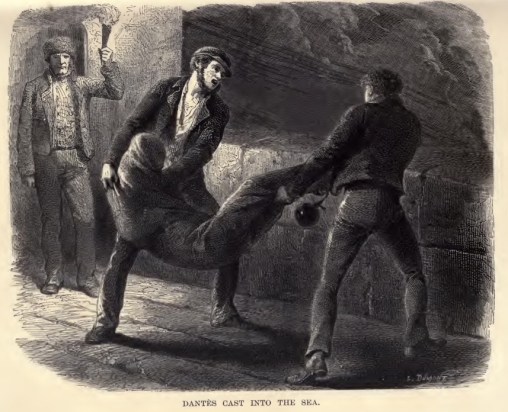Previewed in my post Five-Phrase Friday (37): No “Callow” Craft, this review takes an in-depth look at the final scene of Episode 202, “Not in Scotland Anymore,” in the second series of Outlander STARZ, based on Diana Gabaldon’s second Outlander book Dragonfly in Amber. It is an episode that manages to capture practically everything our heroes grapple with for the rest of the first half of the season. Spoilers imminent.
Paris, 1744. Escape, recovery, new purpose, new digs. Specters of a horrid past in Scotland and its bloody future. Mysticism and superstition in France as in the Scottish Highlands. Duels and fighting practiced, threatened, and restrained. War and religion married in royal ambition. Wine and money mixing with political lies and secret agendas.
Sex, sex, and more sex in anticipation, pursuit, dark corners, and gossip. The irony of an extremely sexy early marriage in Scotland for Claire and Jamie Fraser juxtaposed against their sex-deprived Paris in the aftermath of Jamie’s severe psycho-sexual trauma–at the hands of a real psycho. Old flames re-surfacing. A lowest-cut, billowing blood-red dress. A constipated King Louis XV and his nipple-pierced mistress. A new aristocratic friend forged through sexual misunderstanding.
And finally, an utter change of tone–in the forms of a truly nauseating reunion and a devastating revelation–occurs amidst inner and outer fires and explosions.
Overview
This final scene featuring the Duke of Sandringham’s reappearance begins about seven minutes from episode’s end. For that duration, British actor Simon Callow commands both light and darkness with the aplomb his fans have come to expect and relish.
In this single performance, Callow encapsulates the intriguing essence of the character he and the show’s writers have adapted from Diana Gabaldon’s Outlander book series. Sandringham delivers the final blow to Claire that brings her full circle back to Jamie’s nightmare at the episode’s opening:
Sexual sadist and pervert (Gabaldon’s description) “Black Jack Randall is dead” but “alive in [Jamie’s] head” at the start, and by the end, between them, only Claire learns that Randall is in fact very much alive.
And who should deliver the news? Not even Sandringham, but his secretary Alexander Randall, diminutive, sickly younger brother to the infamously brutish captain. Sandringham’s superior skill in verbal dueling with Claire takes center stage until Alex’s arrival, which, unaided by Sandringham’s intent, perpetrates the final stab for him.
The journey from Murtagh’s spotting of the Duke in the room at Versailles to that painful revelatory moment is intricately layered, extremely tense, and fascinating to watch.
Every single thing the Duke of Sandringham says to Claire and Jamie in this scene represents a provoking, passive-aggressive lunge at them even as he attempts to weasel himself into the position of pitiable victim. His Grace is a walking, talking contradiction, playing his opposing motives, impulses, and meanings off each other to perfection.
Gentlemanly pleasantries interlace with dark, survivalist intentions, and pretenses of buffoonery with calculated and carefully selected barbs. Although not neatly archetypal, Sandringham proves to be the ultimate gentleman jester who only lightly masks his malevolent master mind. The Duke by turns hints at and blatantly flashes his many sides, remaining unnervingly difficult to parse.
Both the more direct, baritoned Sandringham, in conversation with Claire alone, and the falsely polite tenor one, in the presence of Jamie, communicate things that are observable as well as implied or waiting to be revealed.
Beat by Beat: The Lines–and Spaces in Between
A breakdown of character interactions and of the Duke of Sandringham’s comments to Claire and Jamie in this one scene alone makes plain the existence of these layers. Only in the context of known back story, established in the latter half of season one, can the nature of the immediate Fraser-Sandringham conflict and its significance be fully appreciated.
I break the scene down roughly into beats. A beat in story performance can be thought of as “a bubble of action, of dialogue, of thought, or of mood” (source) that represents a shift within a scene.
This final scene makes excellent use of sound and silence (another kind of beat) to convey emotion and drama. Note that the screenwriters may think of these divisions differently; this is my interpretation, with beats labeled by purpose or nature of shift.
Beat 1: Disaster Averted. To open the scene, Jamie thwarts Murtagh’s attempt to exact revenge for the Duke’s treachery, which Black Jack Randall had revealed to Jamie at Wentworth Prison when he burned the intercepted petition of complaint against himself.
The Frasers had entrusted the document to Sandringham for conveyance to London’s Court of Sessions, hoping the accusations of gross sexual impropriety and violence committed by Randall against Claire would countermand Randall’s false accusation of murder against Jamie.
Beat 2: Overture of Good Will. Turning around, a visibly uncomfortable Jamie, shoulders elevated, receives the Duke’s greeting:
“Jamie, dear boy, upon my word. I’m delighted to see you looking so healthy.” The last two words stretch in special emphasis.
While not necessarily insincere, this sentiment, finishing with a broad smile and a glint in the Duke’s eye, could imply he must have some degree of knowledge about what Jamie suffered in the prison dungeon with Randall. Jamie may wonder about this while recalling that time when he was definitely not so healthy. Coming from a known associate of Randall’s and a proven betrayer to Jamie and Claire, reference to Jamie’s health undoubtedly makes him feel ill, but Claire soon catches up, which gives him a moment to recover.
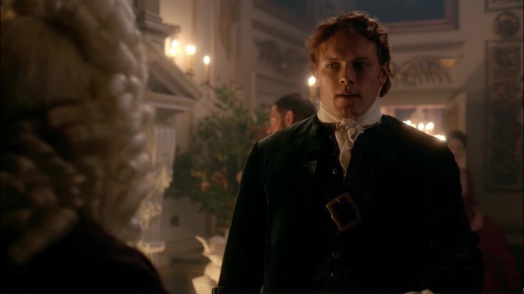
So touched by your concern . . .
Whatever secrets Sandringham may be privy to, the opening comment need be about nothing more than the fact that Jamie recently had been on the verge of death at the hangman’s noose, a matter of public knowledge. He was caught by redcoats in Scotland, tried for murder (Randall had, according to one witness, shot his own sergeant dead before pinning it on Jamie), convicted, and sentenced within a few days while Murtagh and Claire searched the Highlands countryside for him.
The pardon for which Sandringham’s assistance was supposed to pave the way not only did not come in time but was prevented altogether when Randall wrested from Sandringham’s hands their petition document.
More than our shared knowledge of Jamie’s traumatic past, it is the uncertainty in the audience about what exactly Sandringham knows of this not-so-distant history that heightens the suspense and makes his remark to Jamie about his health so unsettling.
Beat 3: Full Reunion. Before Jamie has a chance to respond, the Duke has spotted Claire and begins addressing her with a higher pitch, volume, and degree of intensity. Again in a stretched cadence, he emphasizes her name. “Mrs. Fraser, what a joyful reunion!” he says while reaching slowly for her hands in greeting. Frowning, she withdraws them and notes coldly that she wishes she could share his appraisal of the situation.
Beat 4: Deeply Cut. “You cut me to the quick!” the Duke reacts, straightening in mock offense.
Beat 5: The Wriggling Begins. Then, relaxing, he concedes, “Well, I suppose I deserve it. Let me assure you, I had every intention of delivering that petition of complaint to the Court of Sessions, as I had pledged to do. It was that damned Randall! The brute insisted I give it to him, instead. I had no choice, whatsoever. Will you ever forgive me?”
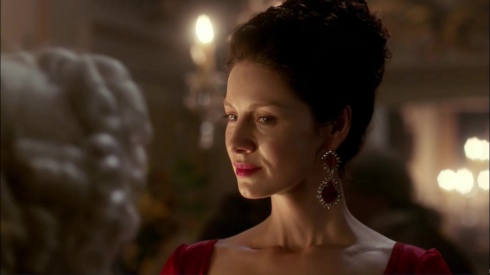
Sure, and I’m Queen of France.
As the Duke professes coercion by Randall, Jamie has joined Claire’s side and gives him a sidelong look of severe doubt. Unflappable as always, ironically, it is Sandringham whose daggers most penetrate, though he says he’s been “cut.”
Beat 6: “Forgiveness.” Considering the Duke’s apology, Jamie then looks at Claire and Murtagh, who is pacing like a caged animal behind them, before he exhales and declares bygones: “What’s done is done.” Jamie knows the importance of smoothing things over with the influential aristocrat (an invented character rather than a historical one).
Sandringham replies, “How true. What’s passed is passed.” The opening and closing of the line drag out here.
Beat 7: Catching Up. He immediately asks, “What are you both doing here in France?”
Such a casual question under most circumstances, again, this one is loaded. As if he didn’t know Britain is no longer safe for them. As if they could have gone anywhere else after fleeing Britain. As if he didn’t know that simply by asking such a question, he is again putting them in an uncomfortable position. Whatever else he may know, the Duke must know that their going to France was no idle decision, as his impertinent question implies.
When Claire responds by explaining Jamie’s been employed by his cousin Jared, she has interjected for Jamie, whose face becomes clouded with consternation, alarmed at the Duke’s question and likely wondering what answer to make.
Beat 8: Capitalizing. Sandringham wastes no time in snapping up the opportunity to buy them off. “The wine merchant? What a serendipitous surprise. Tomorrow I go back to England, but I shall return shortly, and when I do, I should be very interested to sample some of that rare Belle Rouge port I understand he’s stocking. I must have a case.”
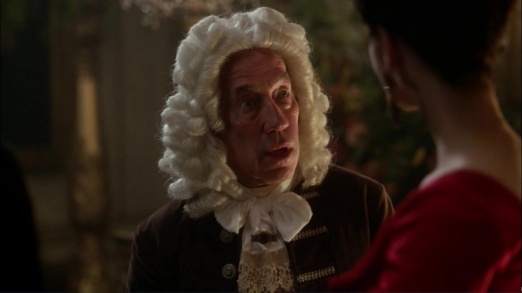
surprised serendipity
How surprising he truly finds their new status is anyone’s guess, but we’re fairly certain serendipity is not involved. He has fabricated it to meet the demands of the moment.
“How much?” Jamie asks, drawing Claire’s incredulous face to him.
“I’d be willing to pay twenty percent over the asking price,” Sandringham offers.
“Sold,” Jamie says with a brief smile while Claire looks indignant on his behalf.
Beat 9: Apology Not Accepted. After Murtagh surmises the Duke’s purchase method (credit) as a way of implying payment may never come, Claire suggests that Jamie and Murtagh go and have a drink with “our new friend, the Minister of Finance,” and on this last phrase she speaks directly to the Duke, as if to pre-empt Sandringham’s next anticipated attack by emphasizing their powerful friends.
Beat 10: A Woman Scorned. The two Highlanders take their leave after a few moments of tense silence during which the smile has faded from the Duke’s face. Perhaps he dreads being alone with Mrs. Fraser? Jamie forces a smile and bows slightly as he departs with a glance at Claire.
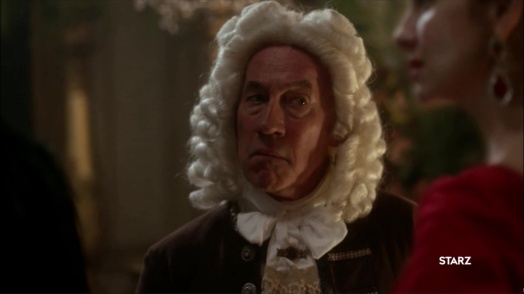
Oh, crap. The pleasant spouse is leaving.
Head lowered, eyes following Claire, Sandringham’s stare never leaves her as she turns her back, ostensibly to watch her husband leave, and then slowly moves to face the fireplace, not speaking.
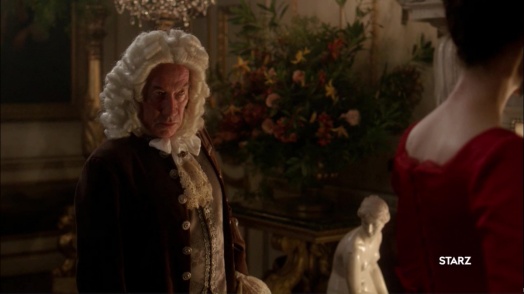
You won’t catch me napping.
Almost 20 seconds of silence pass after Claire sends Jamie and Murtagh away.
Beat 11: The First Mask Falls. The first to speak, Sandringham’s next line arrives in a lower, more ominous tone:
“I see you’re already cultivating important people in high places. How very in keeping with your character.” His remarks and the fact that he speaks first assure us the Duke does not fear her. She says nothing, brooding in the firelight. His accusation betrays his hypocrisy.
Beat 12: A Thinner Mask Applies. Has personal insult not sufficed? Approaching her side, Sandringham pokes Claire again: “Poor Jamie. He must be missing Scotland terribly, but I suppose it’s no longer a safe haven for either of you.” Another broad grin accompanies the last line’s inflection and matching look up at her.
Beat 13: She Speaks. She does not look at him but has fully felt the jab. “Hmph,” and she smiles, entering the game. “Yes, and so here we all are.” She raises her gaze to the mantel and above.
Beat 14: She Aims. A new thought then seems to occur to her as she finally looks at the Duke: “On the same side, no less. All supporters of the Jacobite cause.” The tone in the second line is questioning, but Claire remains fairly certain of Sandringham’s allegiance.
The camera shifts to the Duke’s face, which betrays nothing either way.
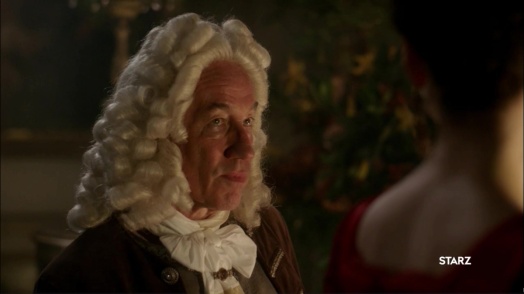
Ah, the question of sides . . .
Beat 15: She Lunges. Claire then turns fully to face him and deliver her best possible thrust: “Of course, you being an English aristocrat, that position makes you a traitor to the crown.” Again, a questioning inflection, but more out of provocation as she stares down into his face from her superior height.
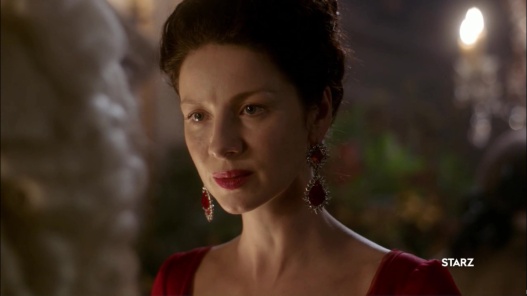
J’accuse!
Beat 16: The Veil Drops, Another Remains. “I see time has done nothing to dull the sharpness of your tongue, Madame.” Unprovoked, the Duke has chosen to down-shift into a personal response to the trivia of Claire’s impoliteness. He has not answered her accusation, just as she did not answer his earlier one. His secrets remain safely his.
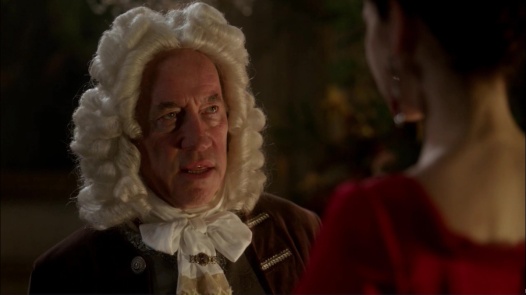
At least her tongue isn’t forked, Sandy!
Claire slowly smiles in feigned politeness, a smirk the Duke returns. Five seconds tick away as they hold each other’s gaze, neither daring to flinch.
Beat 17: Distraction. Alex then enters, gaining the Duke’s attention, announces the impending fireworks, and proceeds to cough, breaking the spell.
“If you must cough on someone, find a servant.”
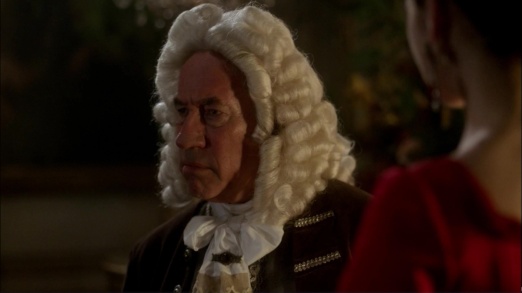
Don’t cough on me, dammit!
Reconsidering his scornful snap, the Duke glances at Claire and asks, “Was that a bit harsh?” Pettiness and irritation at a servant echo His Grace’s behavior during his first meeting with Claire in episode 109, “By the Pricking of My Thumbs.” It almost seems like a coping mechanism, his way of deflecting Claire’s unfamiliar female aggression, taking his discomfort out on a bystander.
She replies, “Oh, just a little,” and turns her attention to her healing function.
Beat 18: Reprieve: A Pleasant Exchange. Alex and Claire discuss the cough and Mary Hawkins, to whom he had been speaking earlier, while Sandringham listens in silence.
Beat 19: Return to the Game. Then, no doubt sensing a chance to continue the verbal duel, he perks up: “Where are my manners? Mrs. Claire Fraser, may I introduce my new secretary, Alexander Randall.”
Beat 20: Messenger of Menace. “Yes, the name is not a coincidence. Alex is the younger brother of Captain Jonathan Randall, Esquire.”
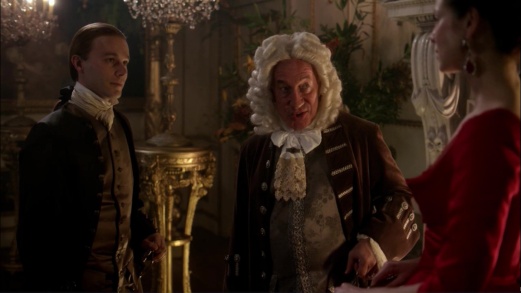
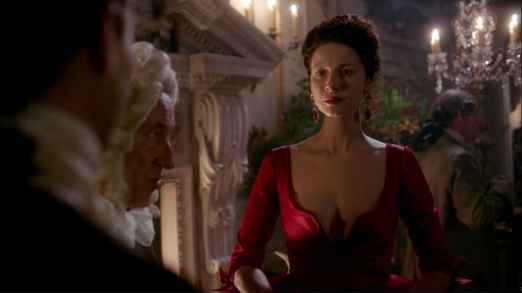
Another Randall? Jesus H. Roosevelt Christ! Is anyone not related to Frank?
To Alex he adds in a more subdued volume and pitch what seems like a casual afterthought, but to Claire, it’s another jab: “Mrs. Fraser and your brother are very well acquainted.” Well acquainted but not acquainted well, which Sandringham knows very well. His satisfaction in this otherwise trivial note is palpable.
Beat 21: Unwitting Accomplice. Alex, oblivious to all that has been happening, innocently says he’ll tell “Jonathan” that he has met Mrs. Fraser. My first reaction, as a book fan, was, “Oh, no, no! Don’t tell him!” forgetting that the show prior to this moment had yet to reveal Randall’s still being alive. The idea of addressing a dead man puzzles Claire.
Beat 22: Utter Confusion, in Micro-Beats. “Tell him? I don’t understand.” With pauses between her sentences, she looks from man to man, searching for the clarity they can only guess at. “Your brother, he isn’t . . . dead?”
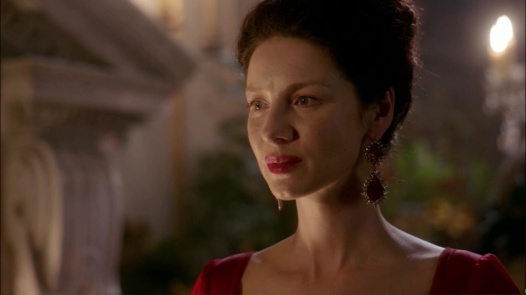
What, is this kid crazy?
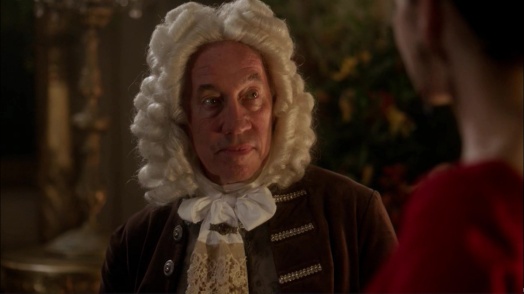
The Duke waits patiently for light to dawn
Beat 23: Final Blow: A Virtual Stomach Punch. Alex scoffs and explains he’s heard from his brother by post quite recently. In shock, Claire visibly weakens at the knees, as if Alex were again delivering to her mid-section the fist she received there from Black Jack in episode 106, “The Garrison Commander.”
The Duke and Alex both step forward instinctively in response to a damsel’s distress. Sandringham asks, “Can I be of assistance?” but Claire, clearly shaken, professes to be fine. The Duke slowly and slightly smiles as he backs off. The wrinkle? What must Alex be thinking? How confusing must it be to see someone react so negatively to hearing his brother is alive!
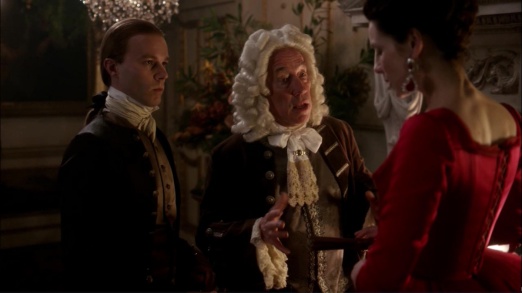
The Deepest Cut
Beat 24: Reeling in Recovery. Claire recovers her self-possession, declines assistance, and says she must have been mistaken.
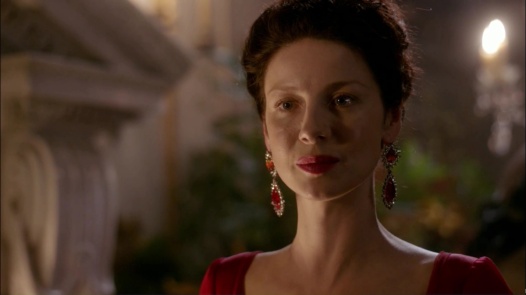
I don’t believe this. I don’t believe it. I don’t.
Beat 25: Revelation and Mockery. Alex concedes Randall was wounded. Then, the camera shifts to Sandringham as Alex mentions the wounds being “not insignificant.” The man is nodding sloppily in glee, a moment of relish for him–now a delighted spectator of Claire’s suffering–and a moment of audience appreciation for Callow’s devilish though humorous head jiggle. It was the first moment when I really started loving to hate the Duke. Alex concludes by remarking on Jonathan’s “stronger constitution than my own” and proceeds to cough again.
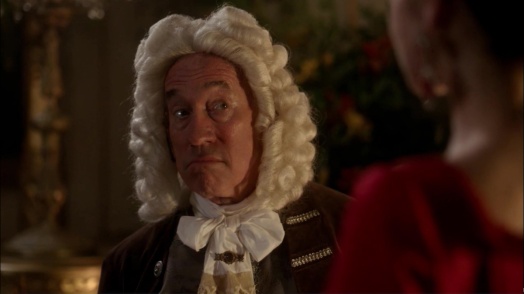
I’ll just let trusty little Al finish you off, maybe join the lads for a wee nip.
Beat 26: Height of Festivity Meets Pit of Anguish. The fireworks quickly take over with a first boom, at which Claire startles. In the ultimate irony of the scene, the men turn to the show while Claire is left to cope with a vastly changed reality. The implications are profound and stand to jeopardize everything, as Claire’s voiceover explains at the end.
“Oh! How lovely!” Sandringham says with a chuckle.
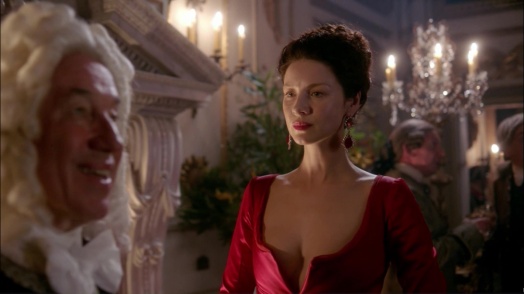
Why can’t the bastard just die already?
Beat 27: Victorious Withdrawal, Gloating. After a pause, the Duke asks Alex between gritting teeth, “But must they be so thunderous?” Clearly bored already, he says to Alex, “Go and fetch my carriage.”
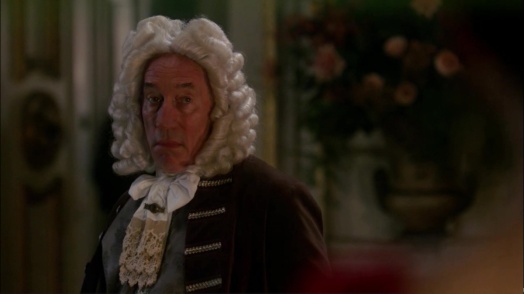
Aw, yeah. Boom! Touche, Lady Biotch Tuarach.
After Alex leaves, a swagger, a gradual turn back to see Claire’s face, and the Duke of Sandringham backs toward the doorway with a smug smile, knowing he’s won this round, and a groaning, mouth-wide half laugh as he turns away to exit. Viewer hatred of the Duke resurges. This is that “what an asshole” moment.
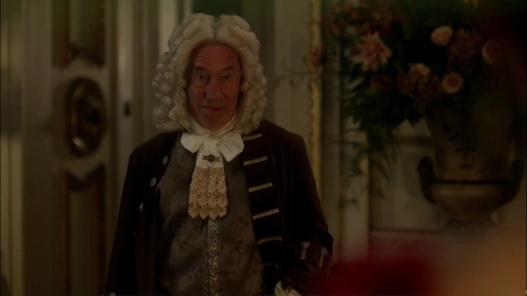
Hee, hee. Yeah, that’s gotta hurt. . .
Sandringham’s dueling opponent is wounded and down, inert and weapon-less. In a stroke of good fortune, his superior knowledge and, thus, readiness have given him the upper hand and assured satisfaction. The Duke exits.
Beat 28: Oh, God. What Now? The scene and episode end with Claire processing the horrible news via voiced-over thoughts and questions, with ominous strings rising. Telling Jamie that Black Jack is alive means risking their efforts to stop the Jacobite rebellion if Jamie insists on revenge. The blue lights of the fireworks flash against the indoor walls and crowd of the French Court, mimicking a thunderstorm.
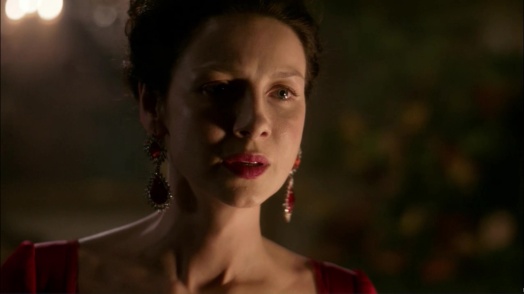
Good, he’s gone. I can panic in peace. . .
The camera follows Claire’s worried search to where Jamie and Murtagh chat with Duverney, the Minister of Finance. The fear and uncertainty of what will happen next envelop her.
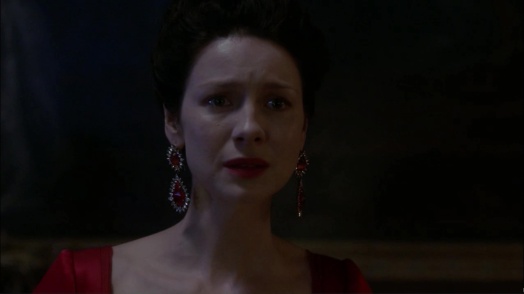
. . . cuz here comes my husband, the Viking berserker.
Then, the camera shifts to the outdoor explosions through the windows as the music surges, contrasting luxurious entertainment and Baroque splendor with Claire’s high anxiety and despair, that the Frasers’ Captain Randall nightmare is in fact as alive as he is.
Summary
The expansion of the Duke of Sandringham character’s role in the story from the book version allows Simon Callow this spotlight. Although events transpire differently in the book, the show’s Sandringham experiences the thrill of being the one to help deliver this nasty surprise to Claire.
All of this happens in seven on-screen minutes, and the scene does not feel rushed at all. Nor does it drag, for all the extended silences, stretched syllables, and wordless daggers.
The layers are what make this possible–the indirect allusions, veiled and overt threats, hidden agendas, ironic intentions, secret knowledge, emotional baggage, Sandringham’s two-faced persona, and a complicated lead-up story.
Exposing the layers and what lies beneath them enables the viewer to experience the scene anew, watch it again with added richness, and continue to follow the story with greater edification, entertainment, and intrigue.
Central to this wonderful impact is Simon Callow’s keen invigoration of the material.
Great Elements of Callow’s Craft: Constructing Sandringham
Delivery:
- Deep voice, gaspy bellowing, snide snapping
- Slow, drawn-out phrases that make him sound out of breath but mainly old and demanding of patience, especially as he wheedles and whines for absolution
- Rise and fall of pitch and timbre, a meandering vocalization the highs and lows of which he is able to travel with ease and nonchalance, like a snake slithering
- Body movement, gesture, posture, tilt, bounce, smile, hand flap, eyebrow action–all inform the flighty persona belying darker motives.
Writing Made Flesh:
- Long on compliments and flattery, short on sincerity but unapologetic for pettiness born of privilege and its indulgence, he assuages, persuades, puts out fires, stokes them too, and grins and bears it all with grace.
- Fickle and flippant on the surface but methodical and discerning beneath, he is a flamboyant, self-assured puppeteer who enjoys the game of manipulation.
- He’s such a presence and a multi-faceted character, he makes you forget he’s gay, a skill which is part and parcel of the character’s wiles.
- By turns playful and grave, the Duke of Callow’s creation communicates that both states are only ever a mask hiding a more complex inner truth.
As the malevolent jester mastermind, Sandringham mimics Twelfth Night‘s Feste without the truthfulness, or true benevolence. A grand chess master masquerading as a colorful fool, the Duke’s power lies in the convergence of his noble status, self-possession, shrewd calculus, and mercurial behavior. Callow has added distinctive dimensions to the character that are sheer joy to watch.
A Final Note: Shooting of the Scene
Along with Simon Callow’s presence and performance as the Duke of Sandringham, the success of the Outlander series comes down to consistent leadership and dedication that ensure all the right elements fall into place in scenes like this last one of “Not in Scotland Anymore.” The world building alone has been impressive in season one and season two.
The microcosm of ep202’s final scene echoes and augments the larger-scale excellence. Storytelling and screen techniques combine to create a space and context befitting such forces of nature as we find in actors Simon Callow and Caitriona Balfe. The sparks of verbal dueling fly, and the actors utterly fill that space. Here are some (literal and figurative) highlights of those key motifs of scene.
Lighting plays a massive role in this scene’s juxtapositions and ironic effects. Flickering light in two basic forms provides the bulk of the scene’s visual symbolism as both allusion and foreshadowing. The yellow fireplace light dapples up and across the characters’ grim faces, recalling the dungeon lantern at Wentworth that burned the petition of complaint.
Later, the blue flashes of fireworks suggest a lightning storm, an adapted trope of the horror and mystery genres, portending the personal and political conflicts to come. Overall, the wavering light and partnering shadows convey the instability and changing visibility of characters’ circumstances and footing. Danger and fear dominate the emotional landscape.
Fire, both literal and figurative, shares lighting’s importance in the scene’s multiple meanings. The hearth and fireworks displays mirror the heat in these characters’ lives—past, present, and future. Burning anger (Claire, Murtagh), documents (Petition of Complaint), tongues (Claire, Murtagh), lungs (Alex), and a past of burned-out body and soul (Jamie) all clash with the Duke’s arrogant coolness.
Sandringham’s appearance lights the fuse that burns for nearly seven minutes until the literal, external explosions of the festivities and the figurative, internal explosion of Claire’s sense of security. All the bottled anger and restraint leading up to that moment find release not in revenge against the Duke for his treachery but in Claire’s loss of composure and vanquished silence.
The uses of light and fire all culminate in the threat of destruction to our protagonists, and the last shot focusing on the fireworks drives the point home as the music rises in ironic Baroque playfulness.
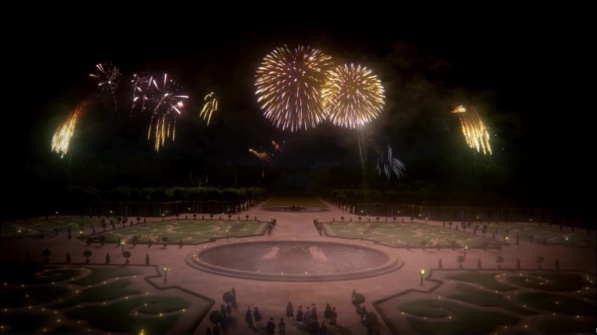
One could go so far as to say that the light, the fireworks, and the music all belong to the triumphant villains of the scene—the wily chameleon in the Duke of Sandringham and the specter of a living devil, Captain Jonathan Wolverton “Black Jack” Randall. They emerge untouchable, the Duke with the psychological victory over Claire Fraser and the captain with his affirmed existence yet absence from the scene.
The resulting cliffhanger suspense at the terminus of such a complex, neatly packed, visually delicious, and dramatic episode brings the viewer back for more without hesitation.
Photo credits: All images by STARZ and Sony Pictures Television, accessed at Outlander-Online.
For my full review of episodes 201 and 202, including commentary on other individual performances, visit “Outlander STARZ, Season 2 Review: Episodes 201 and 202.”
Only one of countless examples of TV storytelling the show aces, the final scene of ep202 foreshadows several events in the series. I hope the show continues to follow Sandringham’s pivotal role in the book’s plot, giving Simon Callow yet more air time.
Tune in to Starz at 9pm ET on Saturdays to find out. This week the Highlanders reunite and prepare for battle. You can also watch Outlander on demand online via Starz Play. As a stand-out episode, I highly recommend ep207, “Faith,” which first aired two weeks ago and presents a dramatic turning point in the season, featuring mind-blowing work by Caitriona Balfe as Claire Fraser.
And there’s so much more to come. This week, World Outlander Day (June 1), the 25th anniversary of the first book’s publication, brought us the gift of the official announcement that not one but two more seasons–3 and 4–will go forward. Hooray!
Long live Outlander. “Je suis prest.”
Hungry for more Outlander reviews? Bon appetit.
Books
Season 1
Season 2
Book 3 and Season 2, Looking Ahead to Season 3
Season 3



